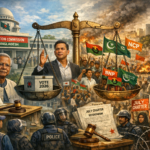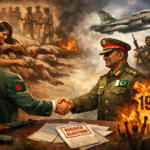Bangladesh’s recent policy to offer free visas to Pakistani citizens has sparked debate, raising critical questions about the country’s strategic goals and the potential consequences of this unprecedented move. Given the history of brutal atrocities inflicted upon the Bengali people during the 1971 War of Independence, this decision appears incongruous and has left many questioning whether Bangladesh is disregarding its painful past for a vague diplomatic gain or economic incentives.
A Diplomatic Shift: Forgiveness or Forgetfulness?
Pakistan’s failure to acknowledge and apologise for the systematic genocide, mass rape, and widespread destruction during Bangladesh’s struggle for independence is a dark shadow that still looms over the bilateral relationship. Numerous Bengali intellectuals, freedom fighters, and families of martyrs have waited for over five decades for a formal apology from Pakistan. This gesture would signify remorse and an acceptance of responsibility. Instead of an apology, what many see is a deliberate attempt by certain Pakistani factions to revise and distort the historical record of events from 1947 to 1971. This revisionist narrative not only attempts to justify the heinous crimes of the Pakistani military but also seeks to undermine the legitimacy of Bangladesh’s independence movement.
In light of this context, offering free visas to Pakistani citizens appears counterintuitive. Is this policy a signal of forgiveness? A gesture of reconciliation? Or is it something more strategic? The ruling government’s motivations for extending such a generous offer remain unclear, and the ambiguity has given rise to suspicions about ulterior motives behind this diplomatic move.
Political Alignments and Strategic Motives
One plausible explanation for this shift could be geopolitical strategy. As Bangladesh seeks to navigate its relationships with regional powers like India and China, recalibrating its foreign policy vis-à-vis Pakistan might be an attempt to diversify its alliances. However, the timing and method of this recalibration are questionable. Granting open visas to a country whose official stance on 1971 remains dismissive not only undermines the sacrifices made during the war but also risks alienating the Bangladeshi populace, who still harbour resentment over the lack of accountability from Pakistan.
Moreover, some critics argue that this visa policy is an effort by the current administration to portray itself as a mature, forward-looking government willing to overlook historical grievances in favour of broader regional cooperation. Yet, the very nature of this decision—made without public consultation and seemingly unilaterally—raises concerns about the ruling party’s disregard for democratic norms and the sentiments of the Bangladeshi people.
The Threat of Cultural and Social Displacement
Beyond the political sphere, the open visa regime raises severe concerns about social and cultural impacts. There are fears that a sudden influx of Pakistani visitors, who might range from economic migrants to cultural performers, could lead to social tensions and cultural dissonance. While proponents of the policy argue that increased people-to-people contact could enhance mutual understanding, sceptics warn that this could open the floodgates to unwelcome elements—individuals who might not share the same respect for Bangladesh’s values and historical narratives.
There is already a growing concern in the Middle East and Gulf countries about the presence of Pakistani beggars, who have been seen as a social menace, drawing harsh criticism and crackdowns from local authorities. If Bangladesh becomes an accessible destination, it might inadvertently attract a similar segment of people, turning cities like Dhaka and Chittagong into potential hubs for illegal activities or unwelcome social behaviours. The concern isn’t just hypothetical. Bangladesh’s major cities, already struggling with urbanization challenges, could become overburdened by an unchecked influx of visitors, complicating law enforcement and social integration efforts.
The Cultural Invasion: A New Wave of Controversy?
The possibility of cultural performers, including the infamous Mujra dancers, entering Bangladesh has been met with a mixed response. Mujra, a traditional dance form that has evolved to include elements that some see as sexually suggestive, could clash with the conservative values held by many in Bangladeshi society. While cultural exchange can be enriching, the introduction of performances that are at odds with local sensibilities might lead to backlash and social unrest.
The question that arises here is: why allow unrestricted entry to Pakistani nationals when there is already a rich tapestry of cultural practices in Bangladesh that deserve to be promoted and preserved? The fear is that rather than fostering genuine cultural exchange, this could become an avenue for cultural dilution, where the already fragile social harmony is disrupted by an influx of foreign influences that don’t align with the country’s ethos.
Security Concerns: A Pandora’s Box?
Security analysts have voiced concerns about the potential for this open visa policy to be exploited by elements with malicious intent. Bangladesh has already faced challenges with insurgency and terrorism in the past, particularly in the hill tracts region and the broader context of the seven sister states in Northeast India. By allowing free entry, Bangladesh may unwittingly open the door to individuals who could destabilise the internal security situation. The possibility of militants, extremists, or operatives using this opportunity to infiltrate Bangladesh cannot be dismissed lightly.
Moreover, Bangladesh’s strategic location makes it a significant target for cross-border insurgency and terrorism, with various groups using porous borders to further their agendas. An unregulated visa policy could make it easier for these elements to gain entry under the guise of tourism or cultural exchange, increasing the risk of internal unrest and external meddling in the country’s affairs.
The Economic Angle: Potential Gains or Illusions?
On the surface, the economic argument for this visa policy might seem appealing. Increased tourism, greater economic activity, and a boost in bilateral trade are potential benefits the government could aim for. However, the actual financial impact might fall short of expectations. Pakistan’s economy is currently grappling with severe challenges, and the average Pakistani citizen’s spending power is unlikely to significantly contribute to Bangladesh’s economy.
Instead of attracting affluent tourists, Bangladesh might find itself hosting visitors who are economically disenfranchised, straining local resources without yielding corresponding economic benefits. The risks far outweigh the rewards if this policy is not managed with strict regulations and a clear framework that ensures economic gains without compromising social stability.
Resetting the Historical Narrative: A Dangerous Game
One of the most contentious aspects of this policy is the perception that it is part of a broader attempt by the current Bangladeshi administration to ‘reset’ the historical narrative. Critics argue that by allowing Pakistani citizens easy access, the government signals that it is willing to overlook historical grievances in favour of a new beginning. This could be seen as an attempt to rewrite or dilute the narrative of Bangladesh’s birth—a narrative steeped in the blood of millions who fought and died for the nation’s independence.
The danger here is that by appearing to forgive or forget the atrocities of 1971, the government risks alienating its people, particularly the families of martyrs and freedom fighters who view any compromise on this front as a betrayal of their sacrifices. Bangladesh’s history is not merely a chapter in a textbook—it is a lived experience for those who endured the brutality of the war and have carried its scars for decades. To disregard this in favour of a vague promise of improved bilateral relations is to disrespect the very foundation upon which the nation was built.
Conclusion: A Policy Fraught with Risks
Bangladesh’s open visa policy for Pakistani citizens is a decision that has far-reaching implications, both positive and negative. While it could pave the way for better diplomatic relations and increased economic activity, it also comes with significant risks that cannot be ignored. The historical wounds inflicted by Pakistan remain unhealed, and any policy that appears to sideline these grievances will face resistance from the Bangladeshi populace.
The current administration must tread carefully to ensure that this policy does not become a tool for undermining Bangladesh’s history or compromising its social stability. There needs to be a clear and transparent rationale for this decision, accompanied by strict regulations to manage the influx of visitors. Without such safeguards, the policy could backfire, leading to social unrest, security threats, and a dilution of the very identity that Bangladesh fought so hard to establish.
In navigating this delicate balance, the government must remember that history cannot be erased or rewritten. The memories of 1971 are etched in the nation’s consciousness, and any attempt to press the ‘reset’ button will be met with fierce resistance from those who believe that the price of freedom cannot, and should not, be forgotten.






